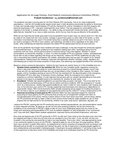


Members of the Point Roberts Community Advisory Committee are working with state and county officials to answer a question county executive Satpal Sidhu asked, distilling a longtime community concern.
“How much money is Point Roberts’ money?”
Sidhu asked the question at a July 9 townhall meeting that brought state, county and federal elected officials face to face with the community. A recurring theme at the meeting was, how does the community keep locally collected taxes in the community to pay for projects and programs in Point Roberts?
Broadband service for the entire Point is at the top of Sidhu’s list of projects to help revitalize Point Roberts’ economic outlook, and other community members brought their own priorities into the discussion: rebuilding the pier at the foot of Gulf Road, the dock at Lighthouse Marine Park, a lighthouse, a sewer system, the return of the Arts and Crafts Festival.
All of it costs money and the community relies on Whatcom County to fund projects and pursue grants. “How do we get them to work for us?” Mark Robbins asked in regards to the county parks department decision not to pursue grant funding for a lighthouse at Lighthouse Marine Park, leaving $500,000 in matching funds on the table.
Arthur Reber suggested the sales tax collected on goods delivered to local parcel services or generated through local businesses should stay in Point Roberts, when it now goes to the county general fund. “We need to get some of our share returned to us,” he said.
Sidhu explained that while cities have their own tax code and get their slice of local sales tax directly from the state department of revenue, the tax generated in the unincorporated parts of the county does not get tracked by location and all goes into the county general fund. “When it comes into the county we have no idea where it comes from,” he said.
Point Roberts Community Advisory Committee (PRCAC) chair Allison Calder has since laid the groundwork to ask the state to issue a tax code for Point Roberts to allow for the tracking of locally collected sales tax. “We have a distinct zip code so there is no problem in establishing boundaries,” she said.
There is also now a precedent for giving tax codes to unincorporated areas. In 2020, the state department of revenue began issuing tax codes to non-native businesses on tribal lands, allowing the tribe to track and receive a portion of the taxes collected. “It doesn’t change the tax rate, just how it’s tracked,” she said. “The funds would still go to Whatcom County but then we can work on an agreement so a percentage of those funds is specifically earmarked for only Point Roberts projects.”
She added the data collected could also be part of the foundation of a solid economic development study, another community priority.
At the August 25 meeting, Calder reported on progress a PRCAC subcommittee created to look into the sales tax issue had made in getting Point Roberts its own tax code. “That would require a legislative change so staff at the state department of revenue are diving in and looking at getting us that information using our zip code,” she said.
Calder also suggested forming another subcommittee to gather data about how much property tax the Point was paying and comparing it to what was being spent providing services to Point Roberts. She said she had started by acquiring tax books back to 2009 from the county assessor’s office and creating a spreadsheet detailing how much Point Roberts was paying into various county funds, the Blaine school district, the Port of Bellingham, the state of Washington and other agencies getting a slice of the property tax pie.
“The next step will be to go through the county budgets and see where we fall for line items under each department,” she said. “It’s an audit to see what we put in and what we get back. If Point Roberts is going to ask the county for infrastructure ,we should know if that ask is reasonable.”
State representatives Alicia Rule and Sharon Shewmake brought another concept to the table at the July 9 townhall meeting to keep local tax dollars in the community.
The Main Street Program, which Rule helped to see successfully implemented in Blaine, leverages local business and occupation taxes to fund a local organization dedicated to revitalizing community core areas. The program allows local businesses to get a tax credit for business and occupation taxes paid to the state by donating to their local Main Street program. That program can then use those funds to build a sustainable commercial core through promotion, design, organization and fostering economic vitality.
“This is basically a tax deduction for businesses to keep local dollars local,” Rule said. “The state Main Street program works with you to put together a step by step plan that is unique to Point Roberts and that will allow you to build a sustainable downtown.”
Several business owners brought up another barrier to a sustainable economy on the Point: a gutted workforce. “The young people had to leave,” said Darryl Marquette of TSB shipping. “Their livelihoods dried up and they were gone.” Several of his employees he had hoped to keep on standby struggled with receiving unemployment benefits and relocated.
Tracy Evans from the Bald Eagle Golf Course and Reef owner Nick Kiniski shared the same concern about hiring staff, especially once the border reopens and their business picks up. Tamra Hansen from Saltwater Cafe wanted to see the reinstatement of a visa program to allow non-management employees from Canada the ability to work on the Point.
Shewmake said workforce development, including creating affordable housing, could be part of a Main Street program for Point Roberts. “What we really need is a staff person here and the Main Street program includes funding for a director.”
Mark Robbins brought up the suggestion of regular bus or shuttle service provided by Whatcom Transportation Authority (WTA) as one avenue to get workers to Point Roberts. Sidhu said he had discussed the possibility with the WTA and “sending a 40-passenger bus up here doesn’t make sense.” It was more likely that a WTA van could be assigned to Point Roberts again and a pool of volunteer drivers could operate it and determine where and when it would run. “We can do some subsidizing,” he said.
Congresswoman Suzan DelBene had only a brief time to speak at the meeting’s start but reassured the community that she was taking the impact of the persistent border closure on the Point to the highest level of federal government. “Everyone I talk to knows there’s a place called Point Roberts,” DelBene said. “If you have problems going back and forth please let us know. We are working to make sure there is a consistent policy in place.”
International Marketplace owner Ali Hayton received hearty applause from the crowd as she emotionally thanked the community for their support, both with their shopping dollars and for lobbying state and county officials to get funding to allow the local grocery store to stay open.
DelBene’s Mount Vernon office can be reached at 425/485-0085 and is staffed Monday through Friday.
PRCAC calls for community input
The Point Roberts Community Advisory Committee (PRCAC) is asking for public feedback on who should fill the two vacant at-large positions on the committee.
Following an August 12 candidates forum, three candidates remain for the two spots: Brian Hunter, Casey Carmody and Prakash Sundaresan.
“We are asking the community to review statements from these candidates and give us their ranked order of preference,” said PRCAC chair Allison Calder. “We will forward the results, these statements and the recording of the August 12 meeting to county executive Satpal Sidhu. The final decision rests with the executive but this gives the community the opportunity to weigh in.”
The candidate statements can be found online at bit.ly/3zzxpY9.
Votes should be sent to prcac.comments@gmail.com
Comments
No comments on this item Please log in to comment by clicking here